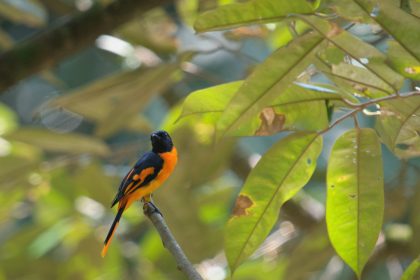Mendolo village is located in the Lebakbarang sub-district of Pekalongan Regency. The Mendolo forest surrounds Mendolo village, and is officially a Limited Production Forest managed by Perum Perhutani, KPH Pekalongan Timur. This site contains one of the 16 critical areas of gibbon habitat in Central Java identified by a 2012 study, and boasts a high level of habitat suitability according to research on the distribution and habitat of gibbons (Widyastuti et al 2020, Setiawan et al. al 2012). SwaraOwa’s long-term projects in this area are all aimed at conserving the Javan gibbons that live here.
According initiate survey, the amount of potential Javan gibbon habitat in this region totals approx 300 ha, (equivalent to 87 football fields) with a gibbon four to six groups in the agro-forest habitat, that we called Wana-Tani in javanese language. other javan endemic primates such as Javan langur ( Trachypithecus auratus), Javan Surili ( Presbytis comata), and Javan slow loris ( Nycticebus javanicus) also occupied this habitat. Their range comprises locations with natural vegetation of forest and shade grown commodities such as kopi robusta, Durian,Petai, Jengkol, banana, kapulaga, and many more. A scheme which aims both to improve the local economy and promote agroforestry is a gibbon conservation project centered on this village.
SwaraOwa first became involved in Mendolo village in 2015, when we were tasked with assisting the Pekalongan district government in surveying and inventorying the protected flora and fauna of the Mendolo forest, among other sites . Nowadays, we pay this village a visit almost every month. These visits are part of our efforts to reach out and communicate with village residents, so that we can find out which local commodities in particular can be prioritised for further development.
Mendolo village is also known for its durian production. In areas where agroforestry is practised, durian is an intensively cultivated crop that is grown among wild trees valued for their wood. In the harvest season, this village supplies the durian markets of Pekalongan and surrounds. Although there is currently no research on how durian productivity relates to bio-ecological factors, there are indications that the presence of pollinators plays a role, more specifically bats and insects such as bees. Honey is one commodity related to durian agroforestry, being harvested in abundance when the durian trees flower.
Almost all residents of this village, especially the men, collect honey from the forest. This tradition has been passed down through the generations. Aside from being used for personal consumption, forest honey also contributes to the local economy. We had previously done a preliminary study to find out what potential harvesting forest honey held for this village. This study motivated the Beekeeping team, led by SwaraOwa’s Sidiq Harjanto, to start seriously experimenting with stingless bee.
The Mendolo Young Farmers Association is the driving force for conservation in Mendolo, fostering a spirit of togetherness and inculcating pride in the Mendolo forest. In the early days, meetings in Mendolo village and training sessions on post-harvest handling at SwaraOwa Yogyakarta eventually gave rise to a series of continually evolving projects spearheaded by young people in Mendolo. The project to enhance post-harvest processes for coffee has succeeded in establishing “Kopi Batir”, a small exercise in entrepreneurship that markets Robusta coffee beans grown in Mendolo. The project operates under the slogan ‘nepungaké seduluran’, Javanese for ‘forging strong friendships’, reflecting how this coffee aims to bring people together.
Projects to promote the conservation of forest areas are emerging at a slow but steady pace, initiated by residents concerned about nature. Birdwatching activities have been and are being developed in Mendolo. These aim to promote the idea that birds and other flora and fauna around the village are an important asset that must be preserved because they promise locals significant economic and ecological benefits.
Activities to strengthen the protection of forest areas but must continue to be nurtured, initiatives from local community to care for nature. Primates and birds observation activities are being developed in Mendolo (the photos above are some of the species encountered during the observation) the aim is To increase the capacity of the younger generation, recognize the important liars’ lives around the village, birds and flora and fauna are also village assets that must be preserved, it is not possible that they can then be economically more sustainable.
Some of the products from activities in Mendolo hamlet can be obtained through Batir Coffee and Owa coffee. Although still on a small scale, coffee and forest cultivated by local residents can help motivate residents around the forest and support gibbon conservation activities and forest conservation in the Mendolo forest area and its surroundings.
This field reports, part of Coffee and Primate Conservation Project 2021, written by Arif Setiawan in bahasa, and translated by TT Chan, supported by Fortwayne Children’s Zoo, Mandai Nature, and Ostrava Zoo.


